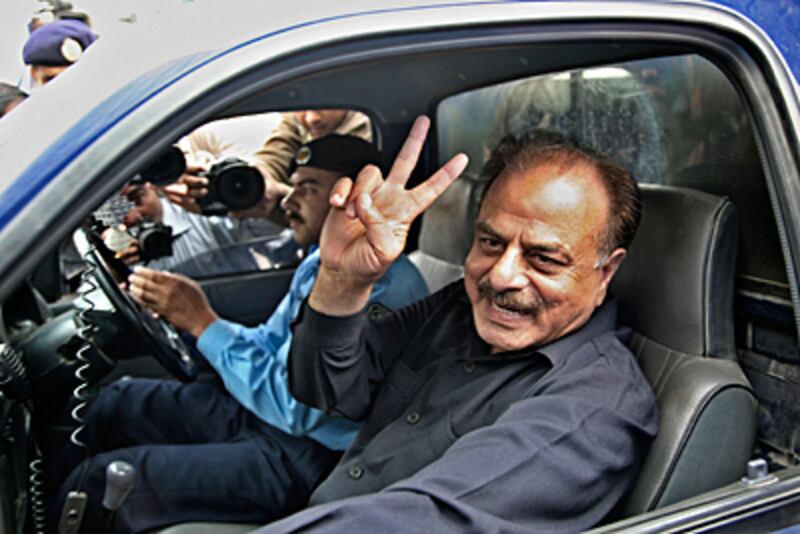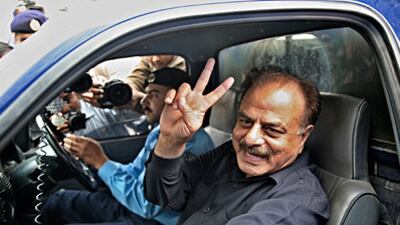Few people know and understand jihadis as well as retired Pakistan Army Lt. Gen. Hamid Gul. From 1987 to 1989, at the height of the struggle of the Afghan and Arab mujahideen against the Soviet occupiers of Afghanistan, Gul headed Pakistan’s premier spy agency, the Inter-Services Intelligence directorate (ISI). Then, he worked closely with his CIA counterparts funneling weapons, delivering money and providing advice to fighters. In the intervening years, however, Gul became a strong advocate for the Taliban—and before 9/11 even for Osama bin Laden, whom he met back in 1993 in the Sudan.

As a result, Gul, who is now 74, has been accused of being a “political ideologue of terror” (by Pakistani President Asif Ali Zardari in the pages of Newsweek) and of even advising and assisting the Taliban’s war against U.S. forces in Afghanistan and the Kabul government.
“For the past five to seven years [bin Laden] had receded into history. They should have allowed him to die naturally. He was a sick man … He is going to be a bigger menace for the U.S. because his legend will live on.”
In an interview with The Daily Beast immediately following the killing of Osama bin Laden, Gul argues that the U.S. would have been smarter to let the head of al Qaeda just fade into history. “The U.S. made a huge mistaking killing him,” Gul says. “For the past five to seven years he had receded into history. They should have allowed him to die naturally. He was a sick man.” Now as a martyr he will even be more dangerous. “He is going to be a bigger menace for the U.S. because his legend will live on.”
Gul flatly denies that the ISI was harboring bin Laden or that it actively supports al Qaeda. “The ISI-al Qaeda connection is very farfetched,” he says. “That’s nonsense and bunkum.” He believes the intelligence failure should be shared equally by ISI and the CIA, not just the Pakistanis. “This is a failure that should be shared by the American intelligence agencies as well because they have superior intelligence (gathering) resources.” He says, “So this is a very unfair tirade against the ISI.”
Gul believes Pakistanis will soon start demanding that Pakistan seriously review its policy of cooperation with the U.S. and perhaps demand their government and army withdraw from participating in the war on terrorism. “Now it is time to call it off, or at least seriously review our cooperation with America.”
More excerpts from the interview:
-On the fallout from bin Laden’s death: We will see more anger and more activity because I think he was a drag on al Qaeda. They had to hide him and finance him. Now that he is out of the way I think their hands will not be so much tied. They will be more active and will have more motivation driving them. So I think there is going to be a greater reaction from the jihadis.
-On a new bin Laden legend forming: The fact is Osama had virtually vanished from people’s memories, especially in the wake of this popular Arab uprising. Now Osama’s death and the myth that’s building about how he stood up, went to the roof and personally brought down one of the helicopters, will energize people. That’s the antithesis of Saddam Hussein who was pulled out of a rat hole and humiliated. The Arab psyche suffered a great setback on account of that. Now those deep scars are going to be repaired because of the actions of this man (OBL.) This is the kind of stuff that folklore is made of. If they had followed him for the past year they should have let him live on and used other techniques to eliminate him.
-On celebrations in the U.S. following bin Laden’s death: America has made a huge mistake in rejoicing over his death. I was aghast as seeing Hillary Clinton’s statement foreshadowing a harder line toward the Taliban. Previously she was saying we will talk to the Taliban but now she has come back to square one saying they will have to put down their weapons. Instead of trimming his sails Obama is trying go harder, faster. They seem to be upbeat and now want to go for the kill (against the Taliban.)
-On charges that the ISI was harboring him: All the blame for this is being dumped on the ISI. Let me tell you one thing. The CIA and FBI and all the other Western intelligence agencies say that the ISI was deliberately harboring him. That’s nonsense and bunkum. The ISI never had any connection with al Qaeda. With the Taliban, yes. But even in my days (when I headed the ISI) we never had any contact with him. The ISI was not in contact with any Arabs, no Arab jihadis.
-On the CIA’s love for bin Laden in the 1980s: The CIA was singing the praises of Osama bin Laden. I heard from them that there is this prince who descended from the heavens and is helping the mujahideen. They used to romanticize him. This man had done a great deal. He was up in the frontlines and was wounded twice. He had tunneled into the mountainside where he stored all this weaponry. He built roads for the mujahideen to carry their weapons across the countryside. Each of the mujahideen groups supported and got money from him.
-On the ISI’s intelligence failure: The ISI had an intelligence failure. We should have known that these people (al Qaeda) had developed a pattern from Khaled Sheikh Mohammed to Abu Faraj al-Libi and others; they were all caught in the cities. The ISI, CIA, and FBI should have known that the places to look for them were not in the tribal areas but in the cities.
-On the setback to U.S.-Pakistani cooperation: The people of Pakistan are smelling a rat. Now we hear (Gen. David) Petraeus is going to start fighting a third theater of war inside Pakistan. So now the people of Pakistan are very alarmed. People are angry at the armed forces of Pakistan for having allowed these raiders to come through without being challenged. They are attacking the ISI. But eventually the anger will turn against cooperation with America. People will demand that this policy (of cooperation) should be reviewed especially in the light of this symbol of terrorism having been eliminated. Now it is time to call it (the war against terrorism) off or at least seriously review our cooperation with America.
Ron Moreau is Newsweek’s Afghanistan and Pakistan correspondent and has been covering the region for the magazine the past 10 years. Since he first joined Newsweek during the Vietnam War, he has reported extensively from Asia, the Middle East, and Latin America.





